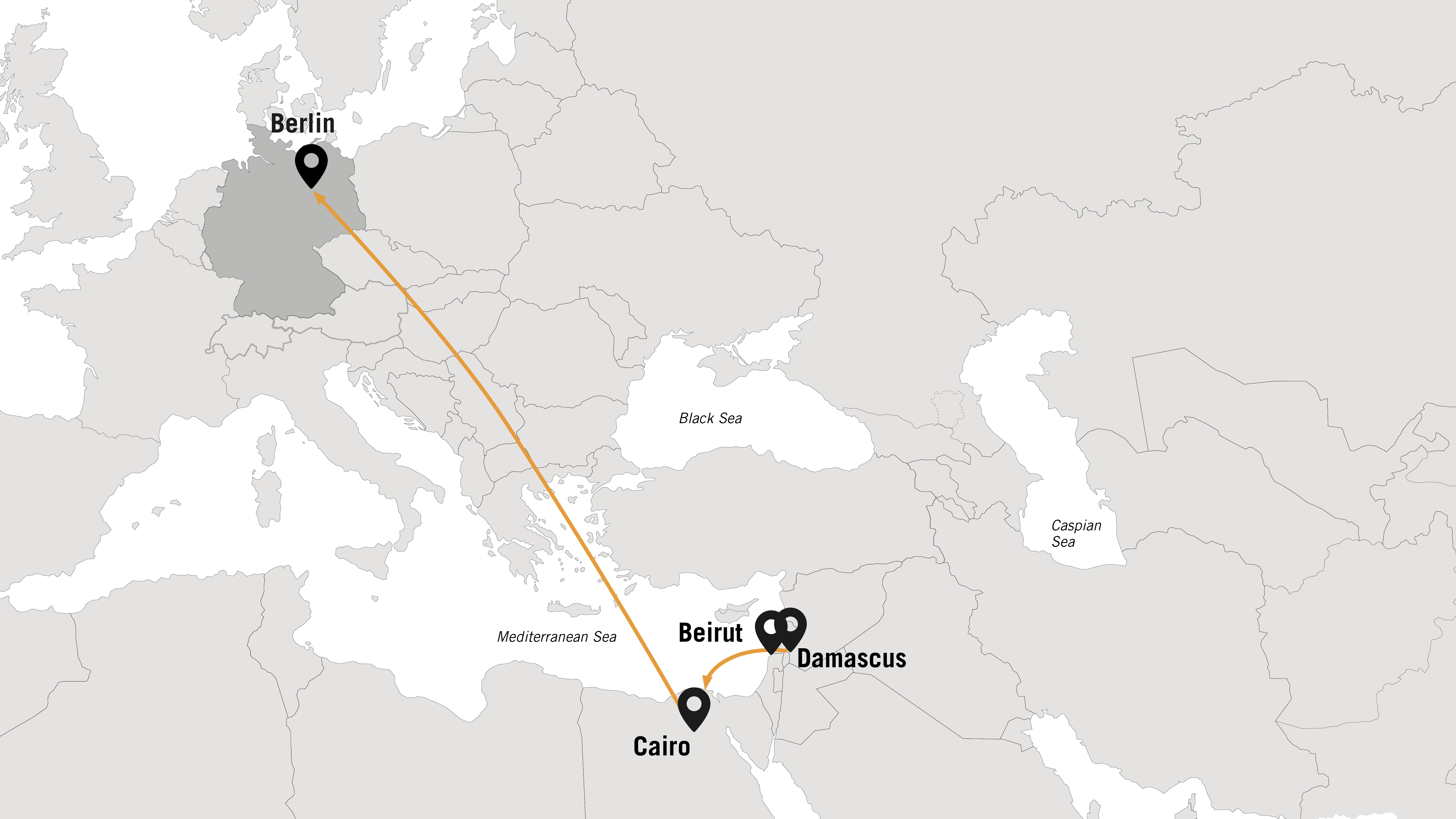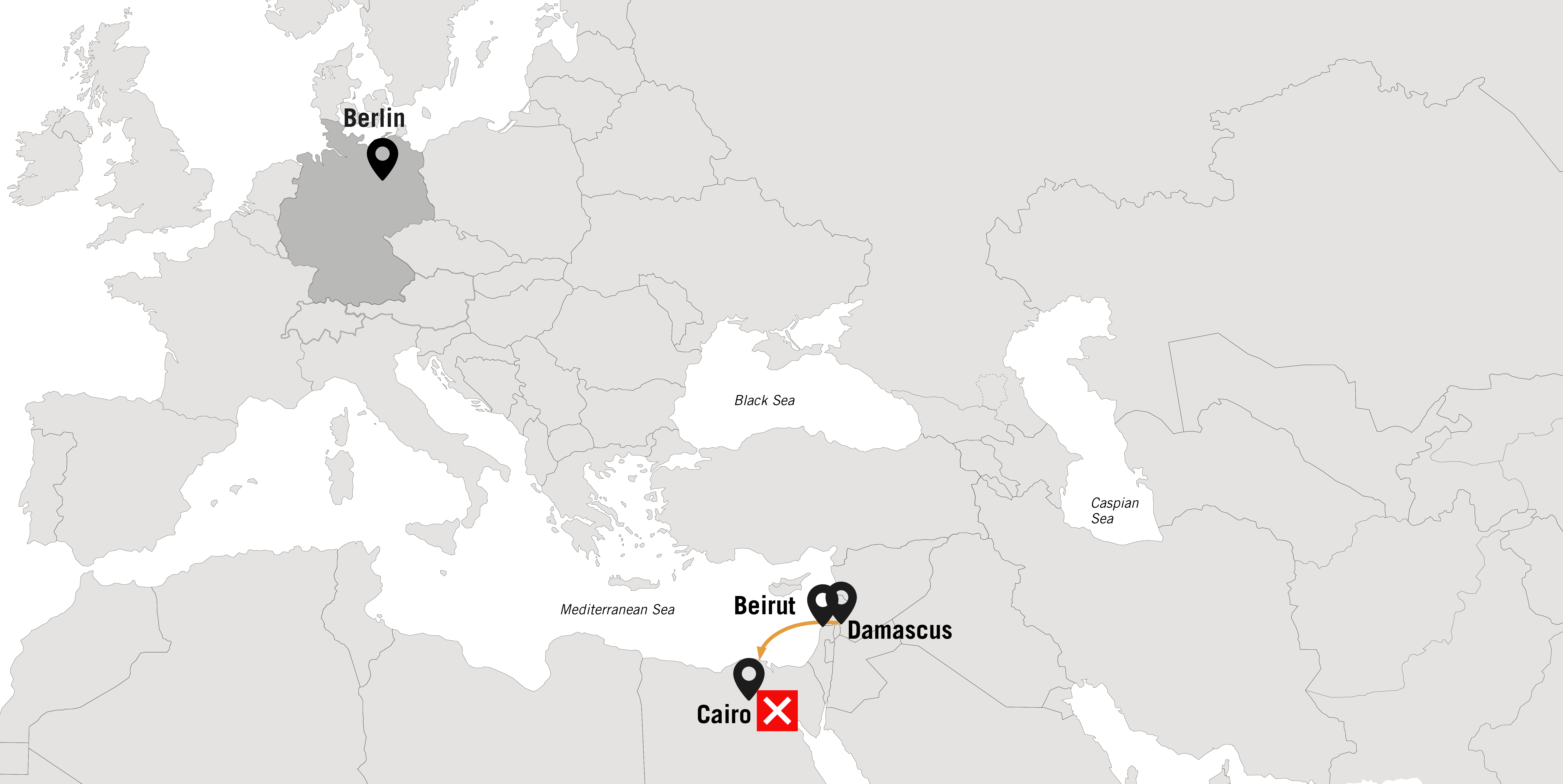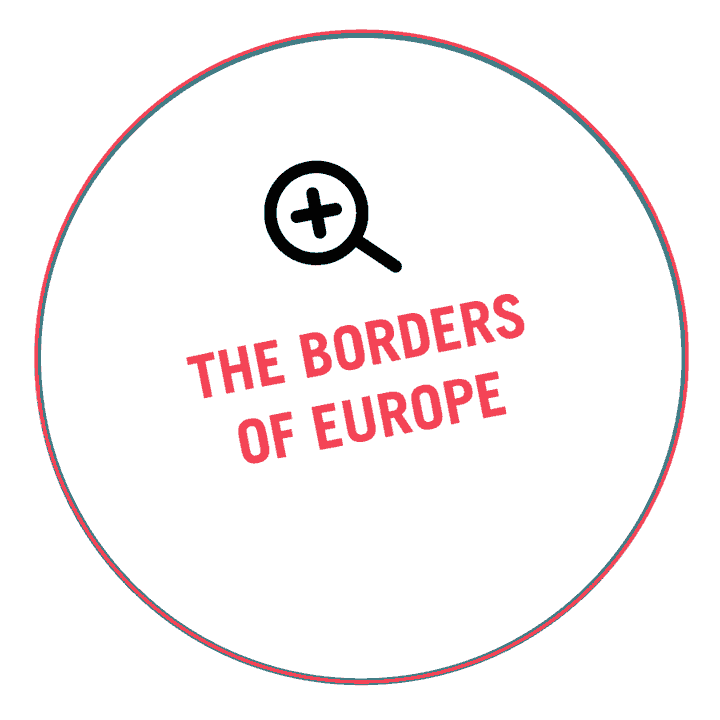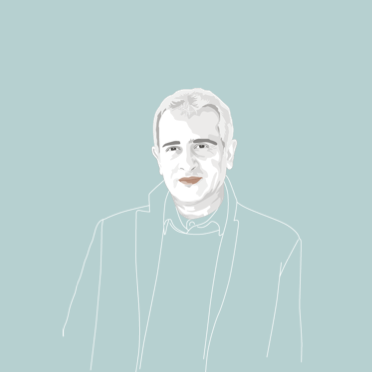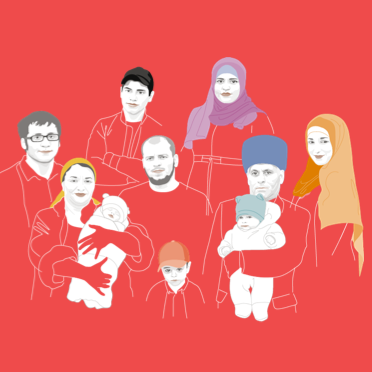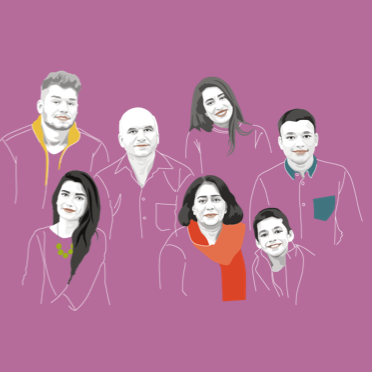Tello family
The Tello Family has been living in Berlin since 2011. The family was initially admitted quickly and simply. But without a settlement permit and naturalization, they have been accompanied for ten years already by fears that at some point they could be deported back to Syria. They are nevertheless building a new life in Berlin. Aside from work and training programs, they are actively working for a peaceful and democratic Syria. They still hope to see Damascus again some day.
Fawaz
Rafeef
Jihad
Leen
Nawar
Damascus, Syria

Rafeef at home in Damascus
Fawaz and Rafeef Tello were born in Damascus, and their three children were born there between 1992 and 2000. The family feels very tied to their city and their home. They lead a comfortable and personally fulfilling life there. Both parents had an academic education. Fawaz studied civil engineering and business administration; and Rafeef, pharmaceutics.
Near Damascus, Syria
Happy family life is overshadowed by the political circumstances in Syria. Fawaz is politically active. He belongs to a group of dissidents that openly criticize the government of Bashar al-Assad. In connection with the Damascene Spring, Fawaz is arrested in 2001 and spends five years in prison. During this time, Rafeef takes care of the family but is under constant surveillance by the Syrian secret service.

Fawaz with Nawar near Damascus, 2010
Damascus, Syria

Jihad at home in Damascus, 2010
Jihad, Leen, and Nawar attend school in Damascus. As children of a dissident, they are threatened and pressured. After their father is released from prison, they live in constant fear of another arrest. When the political and personal threat continues to intensify during an uprising, the family feels compelled to leave Syria. Jihad is able to complete secondary school, but his sister Leen and his brother Nawar have to discontinue their schooling.
Beirut, Lebanon
Fawaz flees by car to neighboring Lebanon and then flies farther, directly from Beirut to Cairo, Egypt. At first the other family members remain in Damascus. They want to wait to see if their father manages to flee. If he were again arrested, they do not want to leave the country without him.

Leen, Nawar, and Jihad at home in Damascus, 2010
Cairo, Egypt

Rafeef took this shawl with her when she left Syria. It is a present from her mother.
After Fawaz safely arrives in Cairo, Rafeef and the children immediately set off. They already have airplane tickets and everything has to go extremely quickly. They take the key to their house with them, in hopes of soon being able to return. The family spends seven weeks in Cairo. Thanks to the efforts of the German Foreign Office, they receive an entry visa for Germany.
Berlin
The Tello family flies to Berlin in March 2012. They receive a three-year residence permit and lodgings in the Marienfelde temporary housing facility. In order to stand on their own feet again as quickly as possible, Fawaz and Rafeef immediately start looking for an apartment. After two months they find something and are able to move. They return to the housing facility in order to tell the story of their arrival in Berlin.

The Tello family in Berlin-Marienfelde, 2012
Forced Migration, 1 year later
"This revolution is everything in the life of every Syrian. They don’t think of anything else in their life. We all have a wonderful feeling, that in the end we will receive a very great reward for us and our children: Freedom.”
(Fawaz Tello, 2012)
Forced Migration, 5 years later

Tello family in Berlin – Spandau, 2016
The family has had their own apartment in Berlin for five years. It gives them a sense of stability and a feeling of home. It is very important to Fawaz and Rafeef to live in a good neighborhood. They want their children to have the best possible opportunities. But for all of them, starting over is tied to great challenges.

Memory of their arrival, 2012
Jihad starts studying political science and Leen starts training as a Pharmaceutical Technical Assistant (PTA). At this point she still feels insecure speaking German. Nawar has a lot of friends in school but like his sister, he still longs to return to Syria.

Exhibition opening, Refugee Center Museum, 2017
Rafeef and Fawaz try very hard to have their university qualifications from Syria recognized. They are able to verify their degrees, but not the required list of subjects. The necessary language competence creates additional barriers.

Germany’s Basic Law in Arabic; exhibition object
For the Life after Forced Migration exhibition, the Tello family chooses a copy of Germany’s Basic Law in Arabic. They would like to see the human and basic rights formulated therein also to be achieved in Syria. Fawaz continues the struggle for that from Berlin.

Key to their home in Damascus, exhibition object
The Tello family also displays the key to their apartment in Damascus in the exhibition. The apartment has since been confiscated. Hopes of returning to Syria soon are dwindling. The tyrannical dictatorship is forcing more and more people, including other family members, to flee the country. When Rafeef’s parents and siblings arrive in Berlin, the Tello family takes them in temporarily.
"The situation in Syria had gotten more complicated. As a politician I know what is going on in Syria. A return to Syria under these circumstances will not be possible very soon, nor will it be easy. And yet I am still hopeful. I’ll always want to return."
(Fawaz Tello, 2016)
Forced Migration, 10 years later
Ten years after leaving Syria, the family is still waiting for their residence status to be more secure.
The family is afraid that in the meantime new laws could be passed. They have already experienced willful delays and discrimination on the part of some authorities. In addition to greater security, a German passport would also mean greater freedom as regards work opportunities.
Nawar is employed by a parcel service and is the only one of the children still living with his parents. After completing the necessary vocational training program, Leen is working in a daycare center. Jihad is writing his bachelor’s thesis, a policy analysis on immigration systems.
Place of Refuge in Berlin-Marienfelde?
Could the Tello family have made it to Berlin-Marienfelde if they had fled ten years later?
Air travel to and from Egypt was interrupted for much of 2020 due to the Covid-19 pandemic, and it was virtually impossible to continue on to Germany by air. The suspension of international air traffic had drastic consequences for many people in Egypt in need of protection. Humanitarian programs to take in refugees were temporarily shut down completely. Within the framework of Germany’s resettlement program, only 25 percent of the planned 5500 resettlements were carried out. Resettlement programs make it possible for particularly vulnerable people to be granted legal and safe passage as well as long-term residence in a third country willing to take in refugees. Worldwide there are more than 1.4 million people requiring resettlement; in 2019, less than five percent of the needed placements were made available by the international community.

